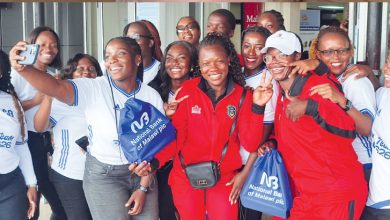University hostels or no man’s land?
It has emerged that as public universities in Malawi grapple to provide decent accommodation for students, the degrading conditions are not confined to private hostels.
At the Malawi University of Business and Applied Sciences (Mubas) in Blantyre, some students described the neglected Chichiri Hostels, which are falling apart, as worse than a slum.
The access roads to the hostels, located about three kilometers from Mubas’ main campus along the Henry Masauko Chipembere Highway, are battered to pits and forgotten—a tale of neglect that typify the off-campus hostels formerly reserved for first-year students.
The congested prefabricated hostels and abandoned staff houses cry for maintenance, with its sky-blue paint peeling off, rusty roofs leaking, power faults and dry taps a constant nightmare.
Most windows are broken, covered with soaked cardboards and breached beddings to wade off cold weather and rainstorms.

Final year student Josephine Kaludzu says the hostel has not been repaired throughout her four-year stay.
She recalls: “Before joining Mubas, my parents and I expected the university to provide decent accommodation with basic amenities, including privacy, water, electricity, free internet and a conducive environment for studying.
“But I had a rude awakening on arrival at Chichiri Hostels four years ago. Now I’m in my final year, but the conditions are still very poor. Electricity faults are endless and the pipes from our bathrooms and toilets get blocked frequently. When we report, maintenance comes after two weeks.”
The six girls’ hostels near Chichiri Secondary School are home to at least 200 girls. There are also seven blocks for boys.
The university modified nine staff houses to absorb increased enrolment. The four prefabricated hostels designed for 30 students each now house more than double the capacity.
Congestion is fuelled by economic hardships, exorbitant private hostels and accommodation shortage.
Private hostels around Mubas bill up to K100 000 per bed monthly, but Chichiri Hostels cost K60 000 annually. Students at the equally neglected hostels at Mubas main campus pay K80 000 yearly.
The reality is that two to three students illicitly share beds, barely a metre wide so they can split the cost.
Some rooms meant for three students now host six, exerting pressure on facilities meant for 240 students.
The rooms for four host over eight, with beds squeezed and a mattress or two laid on dusty floors.
Overcrowding and delayed maintenance denies favourable living conditions and study environment.
Foul smells, greasy floors, cracked floors and dusty rooms welcome visitors into the interiors where locker-less students heap clothes and belongings on the floor and study tables.
The overwhelmed toilets are blocked, stirring a fierce scramble for the remaining few.
In the boys’ hostels, there are no urinals and students urinate under the sinks where they draw drinking water and wash utensils and clothes.
The hostels stink and the bathroom walls are greased with slimy moss left unchecked for over 20 years.
“I’ve no choice but to share a bed with my friend to cut the rentals. But it is what it is,” says a second-year student who refused to be named.
For him, the congested hostel zone is “worse than a ghetto”.
In the hostels, sweltering steam seep from firepots of students who openly cook in their rooms despite being prohibited to prevent fire outbreaks and electrical faults.
“We cannot afford our daily meals from the streets,” another student chips in.
For hundreds of students in Mubas’ forsaken hostels, endless water and electricity faults make life and their studies unbearable.
“When maintenance delays, especially in the rainy season, we cannot cook in time to return to our books. It affects our learning,” he laments.
Water woes worsen the sanitation and hygiene crisis, a breeding ground for preventable disease.
“When taps run dry, we stop studying and go to fetch water wherever we can find it, including neighbouring streams,” says a concerned student.
Education activist Benedicto Kondowe says universities should not only provide a roof for students, but also ensure a dignified and safe space favourable environment.
He states: “Overcrowding and bed-sharing creates health and psychological risks, including disease outbreaks, heightened insecurity and fatigue from inadequate rest
“These factors erode the quality of life and can directly impact class attendance, academic performance and retention rates.”
Mubas registrar Lloyd Kambwiri said the makeshift hostels at Chichiri are “dilapidated and do not deserve to be called hostels”.
The old structures are prone to faults than those built for the purpose at the main campus, he said.
Kambwiri narrates: “For now, we’ll maintain them. But we are in the process of renovating all hostels under the Public Sector Investment Programme.
“We are maintaining flats in the Mubas staff apartment building opposite Kamuzu Stadium to turn them into a more befitting hostel space. One flat alone can replace four of the so-called Chichiri Hostels.”
Kambwiri said the university has yet to officially announce the renovation of the staff apartment.
“At Chichiri Hostels and the Main Campus, there is no difference in terms of some problems such as electricity and water. In fact, we also want to replace the old water design system to prevent regular faults. On electricity, there is a need for power backup, such as a genset,” he explained.
Kambwiri hinted at plans to demolish Chichiri Hostels in favour of a multi-storey building funded through the Public-Private Partnership Commission.
Due to population pressure, Mubas uses a random computer software to allocate rooms to deserving students. Each learner is only eligible for selection twice during their university stay.





